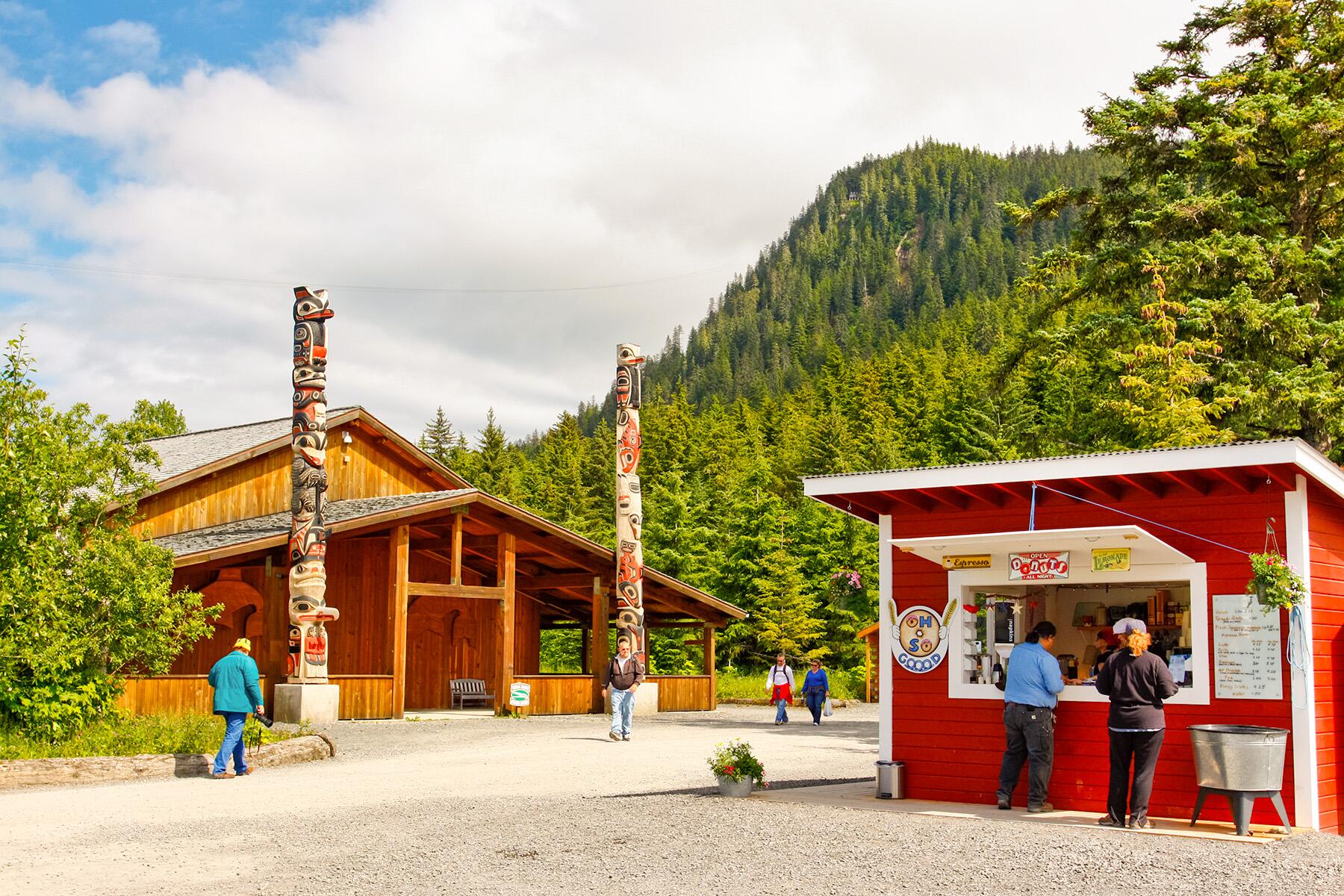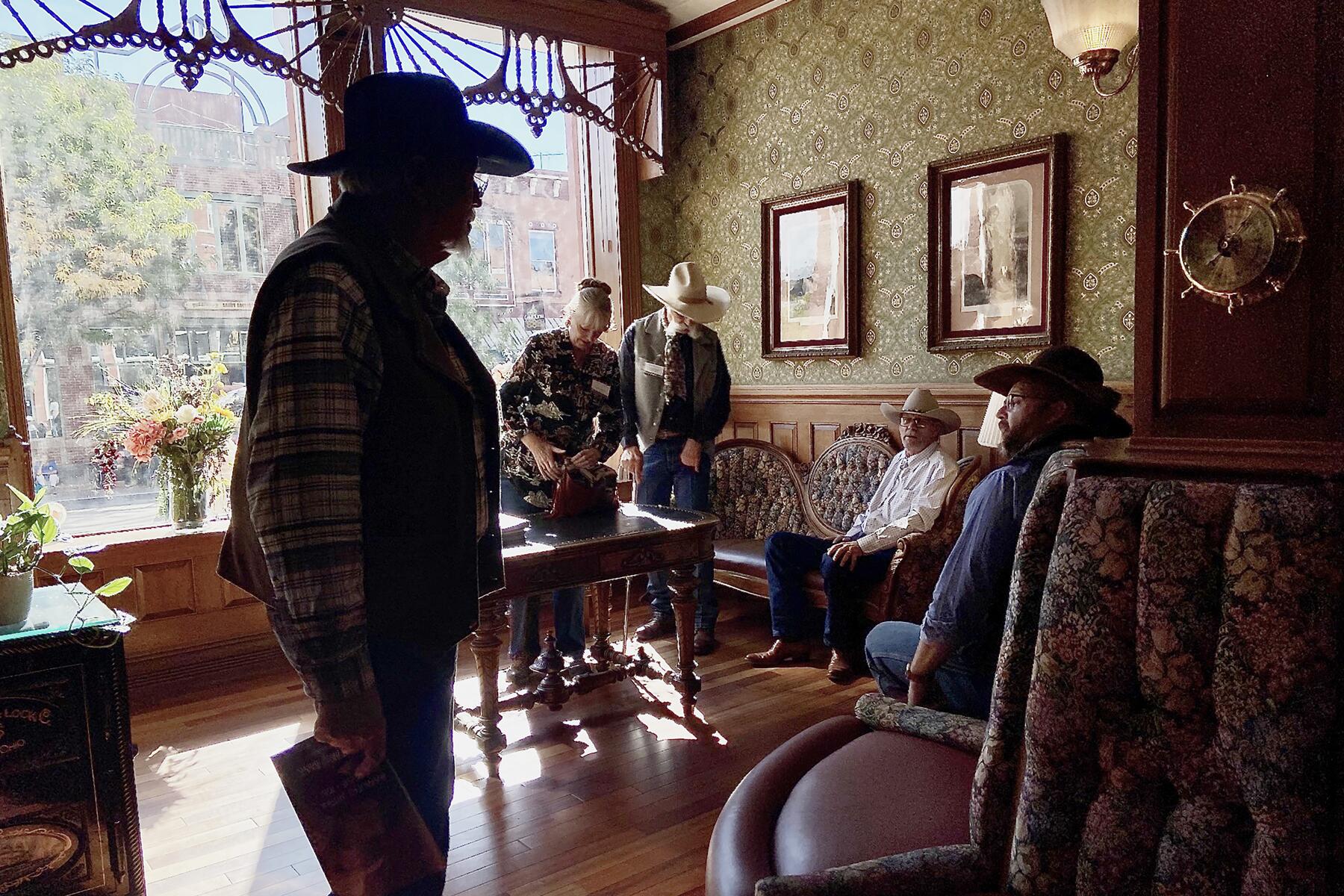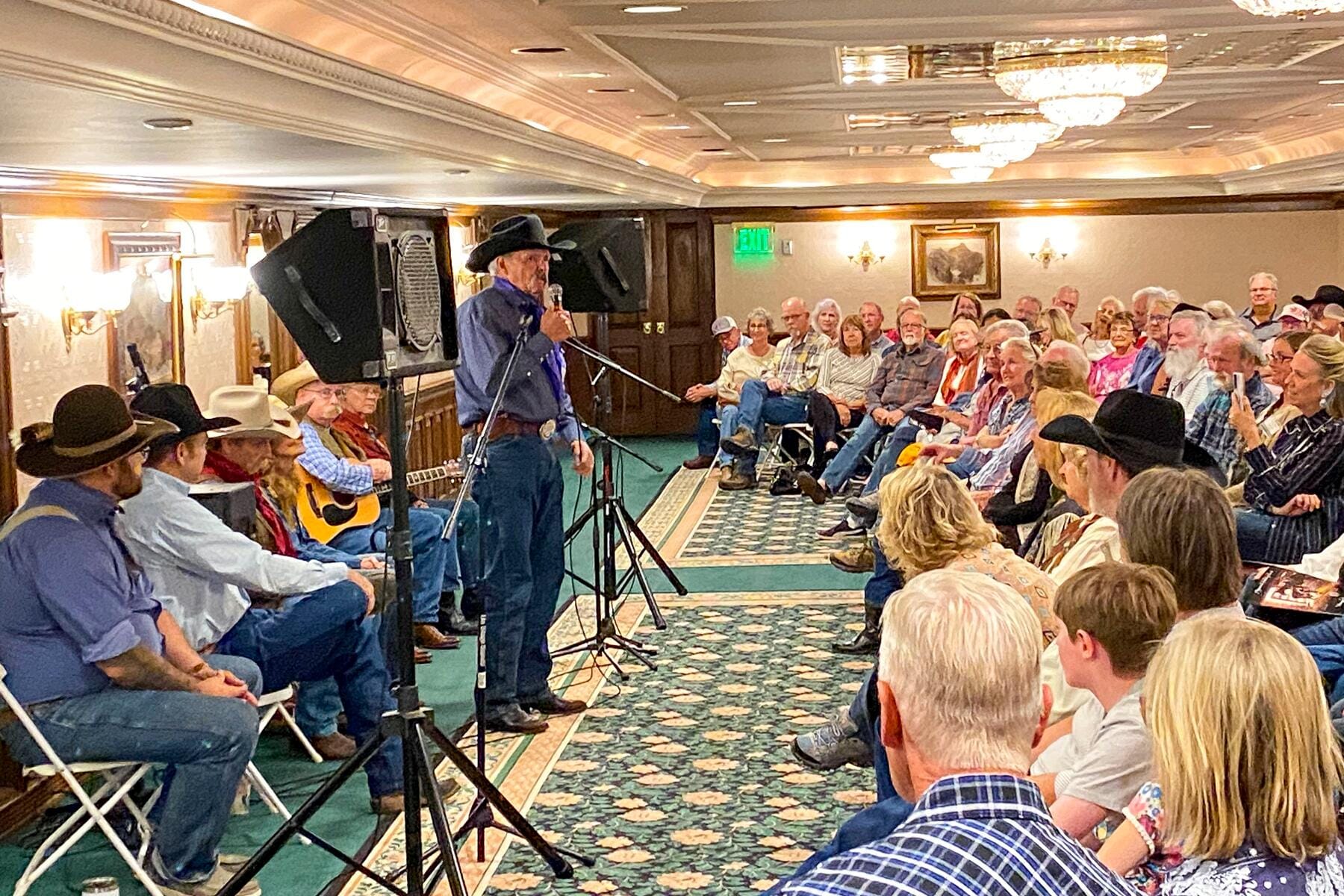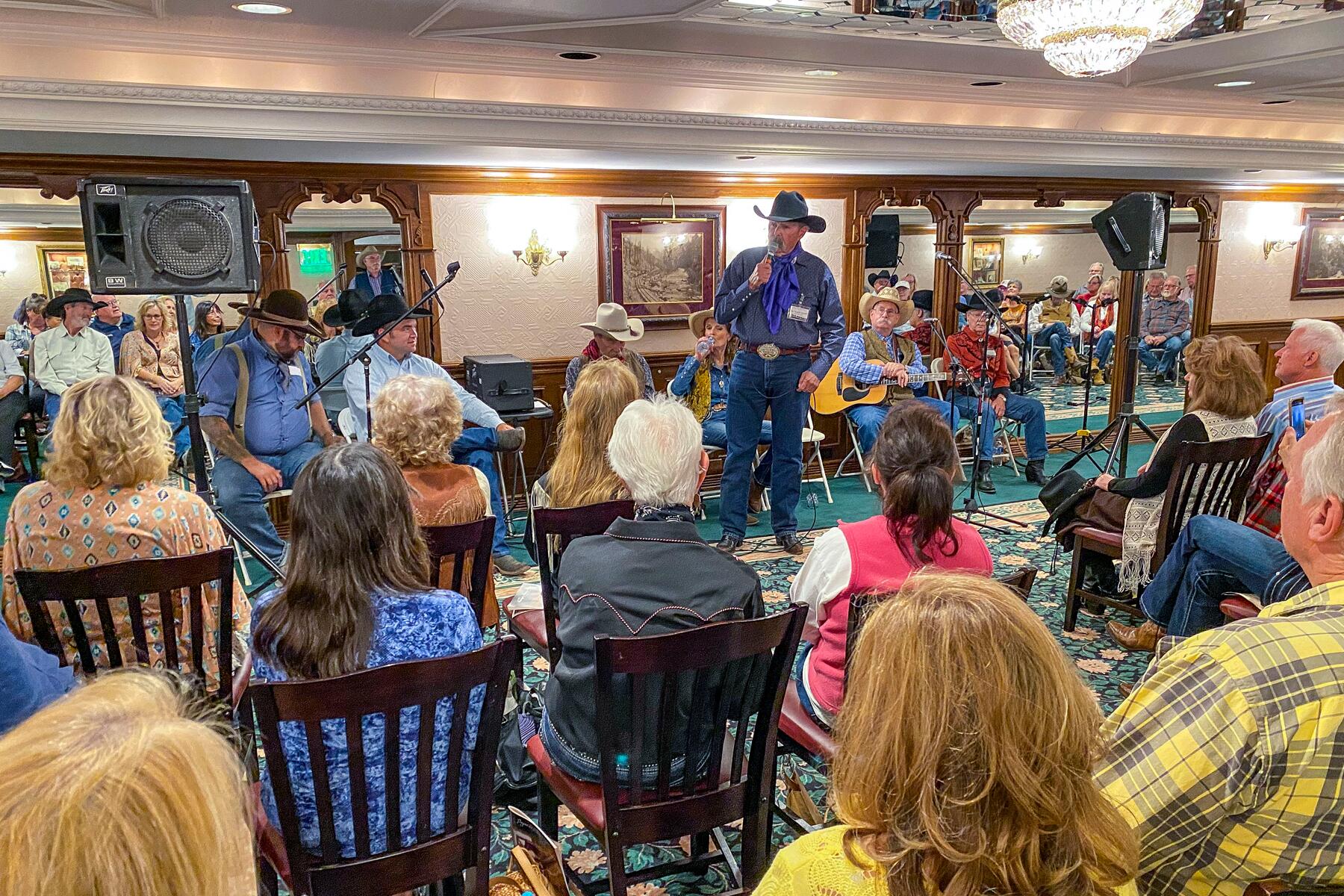For as long as there have been cowboys, there have been cowboy poets.
They speak of the open plains and sing of star-filled skies. They wax nostalgic about the way it was and, with dark humor, complain about today in saloons, rooms, and over campfires to friends and pets.
They are cowboy poets, and they’ve been around since the beginning of the profession. Things have changed since the great cattle drives of the mid-19th century. Now drones keep watch over the herd, trucks drive them to market, and small ranches get devoured by big corporations. But the spirit of the West is unconquered and alive in cowboy poetry gatherings where audiences are entertained and educated about what the West is really like.
Books, movies, and TV would have us believe that back in the old days, cowboy life was dominated by gunfights and brawls in bars and brothels, but if you pause to think about it, every frontier town that prevailed long enough to become sizeable had an opera house, some of which still exist. Colorado boasts an “opera house circuit.”
In fact, interest in the arts and literacy wasn’t unusual. It wasn’t uncommon for a cowboy’s meager saddlebag belongings to include a copy of the Bible and a book of Shakespeare’s sonnets. Inside those opera houses, traveling companies performed works of the Bard and even classic Greek plays in addition to frequently sold-out classical music events.
Recommended Fodor’s Video
On the trail, it was a different story. Entertainment was of the homemade variety and gave rise to storytelling, tall tales, jokes, poems, and songs–the latter of which were also purported to calm livestock. The railroads ended the cattle drives but not creativity. Today, among cowfolk, poems, songs, humor, and performances are still celebrated and created.

Cowboy Poets
I was introduced to cowboy poetry at a dude ranch in the personage of Scott L. Perez, a lanky vision in black from his high-crowned hat to his custom spur-laden boots. A vintage-style Colt revolver hung from his belt, and, fortunately, an impish smile graced lips that were capped with a snow-white handlebar mustache.
Like most cowboy poets, he worked what he wrote about, having herded livestock and working as a guide for horseback trips into the remote country he knows well. Old enough to remember simpler days, he catalogs reminiscences in word picture stories performed at venues throughout the West. His piece “Where Did The Time Go?” is meant to be presented orally, but the written words can give readers a feeling about the man and his work:
I know my days in the saddle are growing shorter,
But I’ve ridden the land from Arizona to the Canadian border.
I worked with some of the finest people a man could ever know,
And I will ride with many more before it is time for me to go.
I’ll keep this way of life going as long as I breathe,
And when I pass on, I don’t want people to grieve.
For I have lived the life of a cowboy. I’ve been wild and free.
I have no regrets. And I still have country to see.
I was intrigued and began delving deeper into the art form. Through the internet, I encountered the most famous cowboy poet, the legendary Baxter Black. He started as a veterinarian and then veered off into a career that took him from stages all over the world to the Tonight Show and eventually became a regular on NPR. No longer with us, his work is frequently performed at cowboy poetry gatherings. Black was fun, lively, evocative, and sometimes challenging because of esoteric ranching terms, but always thought-provoking and entertaining. For me, he was also inspiring.
I decided to try my hand at writing some cowboy poetry. For background, I‘d done some farm chores but haven’t worked on a ranch. I had friends who did, and I’ve spent time in such environs. So, I knew many of the terms and had experience as a performer. I tried my stuff at parties, a wedding, and even on a test audience in a cabaret theater where I went over BIGTIME.

Trying My Hand at Cowboy Poetry in Durango
Months later, with a half-dozen poems under my belt and success at more outings, I traveled to Durango, Colorado, for one of the oldest cowboy poetry gatherings. Of course, being a “greenhorn,” nobody knew me. But that’s okay, as the gathering is loose and friendly, with anyone welcome to take the stage during open mic opportunities.
Durango has a wonderful old-west feel, which was bolstered by the presence of duded-up cowfolk, and cowkids rounding out the family. The atmosphere was fun, and many of the attendees were not only fans but working ranchers and growers as well. Authenticity was palpable. Laughter filled the hotels, bars, restaurants, and performance spaces and workshops abounded. There were cowboy poetry and song performance trail rides, chuckwagon breakfasts, a cowboy church service, and even a rolling show aboard the Durango & Silverton steam train.
Another themed attraction was the largest non-motorized parade in Colorado, which kicked-off with a satirical recreation of a showdown between lawmen and robbers on the street where the actual confrontation took place. No bandits were harmed in the remaking of this local legend.
Then it came time for my go at the open mic performance–in front of real cowfolk! And this was when the fun went funky. Never having been to a gathering before, not knowing the town, and definitely not wanting to be late in signing up and therefore missing out on my chance, I scouted the venue early. It was a cozy little wine bar.
The man who cheerfully greeted me seemed excited about the poetry open mic but then asked, “When is it?”
“In about an hour,” I replied.
“Oh. Where?”
“Here!”
There was an embarrassed beat of silence during which I figured there’d been a lack of communication somewhere down the line.
So, I followed with, “Can I please talk to the manager?”
“I’m the owner.”
He hustled to prep the show, designating a spot outside on a small wooden deck in the hot sun and rustling up a sound system consisting of a microphone and a 9-inch guitar practice amp. He also crafted and set up a sign on the sidewalk outside announcing the performance.
People began to drift in. All were fellow performers and included a group of school kids with their parental entourage. We block-printed our names on a list and I wondered if that choice was for clarity or because kids don’t learn cursive. Then Lindy Simmons entered and took her place at the front table. A poet herself, Simmons is president of the organization that runs the annual event, “Talent Wrangler,” and the presiding show judge. The real audience–meaning folks who were neither performers nor affiliated with performers–probably numbered a handful, including the folks watching outside on the sidewalk.
A shrill whistle blew; it was not the starting signal but the nearby tourist train at the station across the way. A huffing locomotive is normally exciting but, against the intermittency of the underpowered mic, it was a noisome distraction against which the performers determinedly displayed a shared attitude of “I think I can.”
Against the background cacophony, a long-bearded old-timer barkingly read poetry from his cell phone; several schoolkids shouted out works they’d memorized. Then it was my turn, just as three busses hissed to a stop and, rumbling loudly, disgorged loads of passengers bound for the train. My dulcet intonations gave way to miming the words and wildly flailing charades. The poem was short so I only sustained a minor shoulder dislocation.
All performers bravely soldiered on to the next round. We supported each other with genuine appreciation for the efforts shown. One of the schoolgirls delivered her own poem, and it was pretty good. The old-timer just read to himself. Then I was up again.
With a defiant glare in the direction of busses and the train station, I strode forward into the “crowd,” taking a full two steps, dropped the mic at the beginning of my spot, and projected with all the might and purpose of a military commander. I did not cease my grand gestures. The kids snapped to attention, their parents turned to look, Lindy Simmons stopped making notes to stare wide-eyed, and even the inebriates paused in mid-guzzle as I sailed into a very uncharacteristic cowboy tale of a four-day lasso battle with a giant lobster. It was real Pecos Bill/Paul Bunyan frontier legend material. At the end, the applause was hearty and genuine. Lindy Simmons stood to her feet to cheer, “That’s a classic!”
It looks like I–or, rather, my cowboy poet alter ego whom I’ve named PJ–is going to be invited back next year. As a pro. On the big stage. So come on by–the next gathering is October 3-6, 2024. It’s fun, affordable, accessible, educational, and who knows what it’ll inspire in you!?
Wonderful story on Cowboy Poets by Mr. Paul Ross! I read every word from beginning to end. Evocative, moving, and written with a good sense of the rhythm of the English language. A pleasure to read. I've been working as a travel editor and writer for several decades, and I would have been proud to have had my byline atop this story. Good work, Mr. Ross! I'll be looking for your byline from now on.






I recently heard cowboy poet Paul Ross perform in Santa Fe, and he was shockingly great - shocking because I knew him as a photographer, with no idea of his talent as a poet and performer. Cowboy poetry is not something on my radar, but Paul's lyrics and delivery made that medium immensely enjoyable. What a surprise! He'll probably gain more converts...